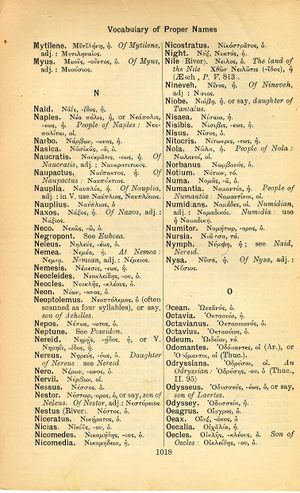Naxos
Περὶ τοῦ ἐπέκεινα τοῦ νοῦ κατὰ μὲν νόησιν πολλὰ λέγεται, θεωρεῖται δὲ ἀνοησίᾳ κρείττονι νοήσεως → On the subject of that which is beyond intellect, many statements are made on the basis of intellection, but it may be immediately cognised only by means of a non-intellection superior to intellection
English > Greek (Woodhouse)
Νάξος, ἡ.
Of Naxos, adj.: Νάξιος.
Latin > English (Lewis & Short)
Naxos: i, f., = Νάξος,
I the isle of Naxos (now Naxia, or Axia), in the Ægean Sea, the largest of the Cyclades, famed for its wines, and for the abandonment there of Ariadne by Theseus, Plin. 4, 12, 22, § 67; Verg. A. 3, 125; Ov. M. 3, 640; Prop. 3, 17 (4, 16), 27.— Hence, Naxĭus, a, um, adj., Naxian: turba, Prop. 3, 17 (4, 16), 28: juncus, Plin. 21, 18, 69, § 115: ardor, Ariadne's crown, a constellation, Col. 10, 52: cos, = Ναξία ἀκόνη, a whetstone from Naxos, Plin. 36, 22, 47, § 164. —Subst.: naxĭum, ii, n., a Naxian whetstone, Plin. 36, 7, 10, § 54; 37, 8, 32, § 109.—
II An ancient city of Sicily, destroyed by Dionysius. On or near its site Tauromenium was built, Plin. 3, 8, 14, § 88.

